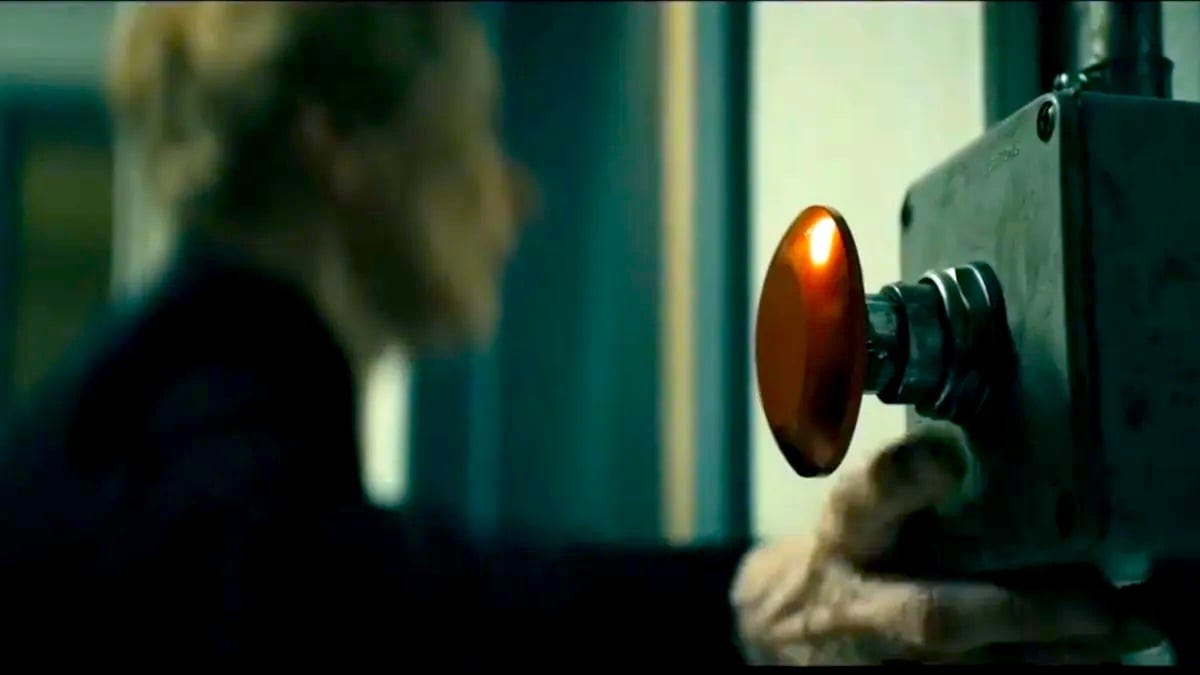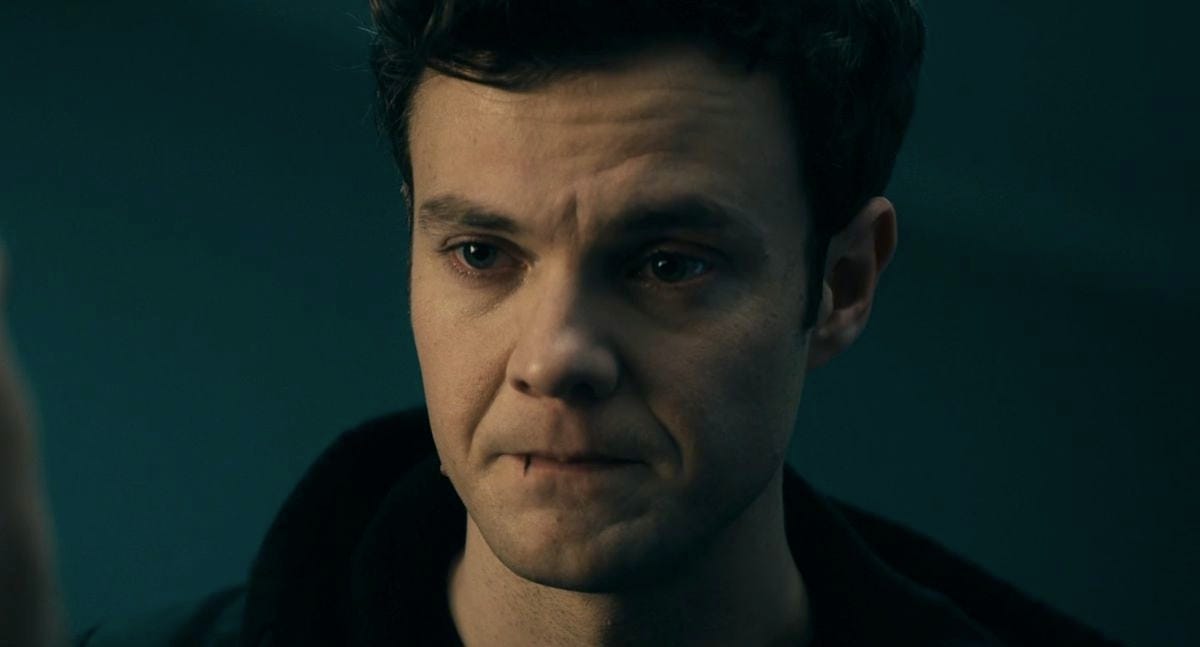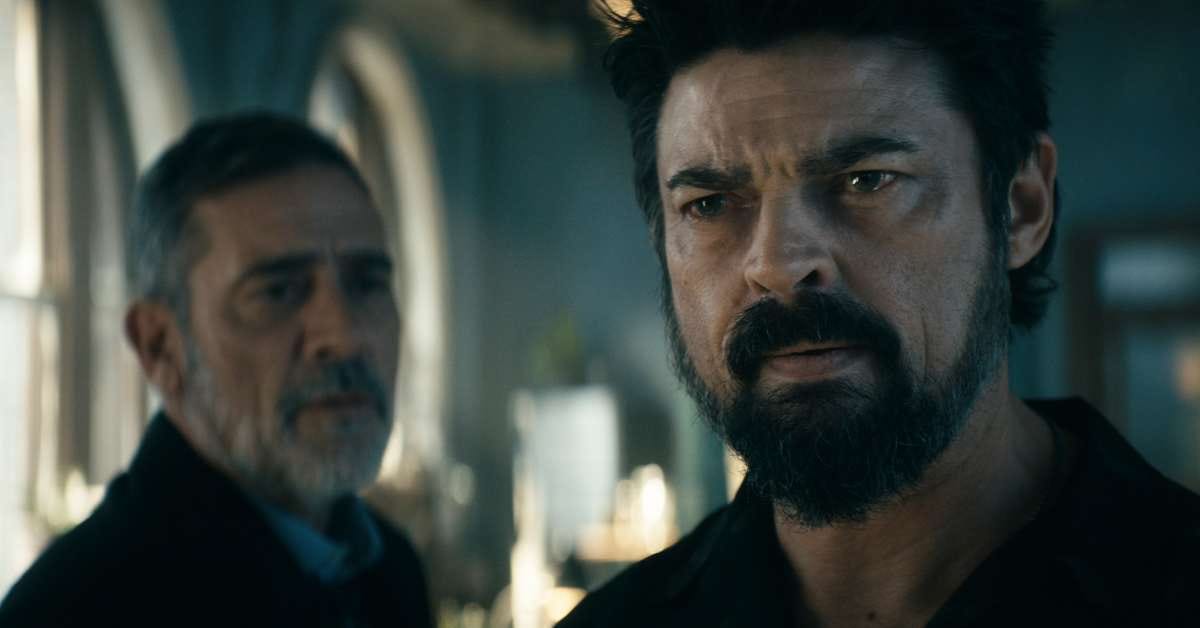The Boys' fourth season ends on a note as black as Billy Butcher's soul
After an unexpected chance to find the light, the series lists back toward darkness in its penultimate season.
CAUTION: This piece contains major spoilers for S04E08 of The Boys - “Assassination Run”
There’s been a subtle theme of people breaking good on The Boys this season. It’s always been a dark show, about people screwing up and playing in the dirt in the hopes of keeping others clean. And yet, there’s been conspicuous throughlines this year -- about A-Train turning to the good, about M.M. coming into his own as a leader, and in a weird way, even about Homelander becoming a better father -- that brought more and more folks into a certain kind of light.
You can see that in “Assassination Run”, the finale of the show’s fourth season. Time again, our heroes decide to try for something better, something more hopeful, with an aspirational bent than belies The Boys’ usual cynicism.
After a season’s worth of struggling with her past and her identity, Annie January starts to reconcile how she sees herself. It’s admittedly strange (albeit on brand for this show) that what pushes her to that point of self-actualization is a sociopathic doppelganger who thinks the worst of her after seeing inside her head. Not for nothing, the cruel shapeshifter makes for Erin Moriarty’s best performance this year, as she revels in getting to play the heel for once. Plus, the show’s production team does extraordinary work in putting Starlight and her double on screen together in close quarters.
And yet, although what gets Annie out of her funk is a little ambiguous, seeing this vision of her worst possible self gives her the opportunity to reject it. Beating up someone who looks exactly like you, Captain Kirk-style, apparently provides some moral clarity. More importantly, though, Annie’s confident enough to know what she wants to fight for, and who she wants to fight alongside. After a tough go this season, that's enough for her to have a breakthrough and help save the day when it’s needed most, and a heartening place for the character to land.
Kimiko and Frenchie have a bit of a breakthrough too. After participating in these grim events and feeling the good vibes despite difficult circumstances, they resolve to try to forgive themselves a little bit each day. The idea that there is bravery in that, a chance to grow and move forward, is wholesome, especially when the two of them find solace and comfort in one another.
I’ll admit, I’ve never been a big Frenchie/Kimiko shipper. The relationship always felt a little troubling given the state that Frenchie found Kimiko in, and at best, a little too brother/sister in the vibe. But I can't deny that they’re sweet together here. And with a first kiss on tippy toes, sweetness isn’t bad amidst all the darkness.
Hughie is the one most determined to cut through that darkness. If there’s something in The Boys that is aspirational, that speaks to human resilience and decency, it’s his pitch to his friends and allies to do better.
The cynical view is that too often, superhero flicks tell us implicitly that violence is the solution, and that the answer to terrible danger and vicious threats is to punch them in the mouth, preferably with a superpowered fist. Instead, Hughie proposes something radical, albeit (somewhat ironically) in line with the philosophy of Professor X.
He suggests that to forgive is even more courageous, something he learned from his dad and extended to his mom. He’s seen the way his friends’ lives have become fucked up from them becoming monsters to fight monsters. He doesn’t want that anymore, for him or those he cares about. So when Victoria Neuman wants out, when she realizes this is a constant cycle of mutually assured destruction that only ratchets up to become worse and worse, when she sends out an olive branch to The Boys, Hughie urges them to take it.
They trust but verify, in M.M.’s words. But they are open to truth and reconciliation, to charting a different course than the brutal and bloodstained one that the cold war between the Supes and the Boys have been fighting since the show began. So when Neuman walks in, daughter in tow, ready to give peace a chance, even after all they’ve been through, our heroes, super and otherwise, are ready to accept her and find another way. This is the chance to break good, to turn a corner, for the Boys to aim for decency and detente rather than death and destruction.
And then Billy Butcher barges in to tear it, and her, completely apart.
The evil grin Billy Butcher let loose in “Beware the Jabberwock, My Son” reminded me of the devilish smirk Tony Soprano gave in a late season episode of The Sopranos. If there’s a consistent theme in that show, it’s about people having opportunity after opportunity to make a change for the better, to shed the damage and dirt they’re all mired in. And yet time and time again, generational inertia or institutional entropy or just plain selfishness drags them back down in the muck.
That's what I think of when I think of Billy Butcher here. God help him, for all that he’s been going through, he’s tried to keep a hold of his better self. He’s held onto the memory of Becca as the manifestation of his better angels. He’s set aside the idea of wiping out all the Supes because it would hurt the one near and dear to his heart. He’s tried to protect his surrogate little brother, asking Hughie to carry on his wishes, even if he can't be there. He even offers an apology, albeit a vicarious one, to The Boys that he’s asked so much of. For as blackened as Billy Butcher’s soul has become, he’s held onto enough of the light to stay afloat.
And he’s done it all for Ryan. Whatever else you might say about Billy, he genuinely loves the kid. When Grace wants to push Butcher’s surrogate child, or force him, or cajole him, Billy persuades her to ease off. He wants to reassure the young lad, show him where he’s safe, rather than trap him in the same kind of cage where Homelander was made into a monster. This is a caring, empathetic side of Billy, the side that we’ve only seen come out rarely. And when he thinks he’s on his deathbed, when the easiest thing to do is try to tell a child to simply do as you say, he responds instead with compassion and kindness.
And still, it’s not enough.

That isn’t Billy’s fault. Everyone’s understandable here. Grace loves Ryan no less but she knows the stakes and takes a justifiably direct approach that nevertheless ends up only serving to scare the poor kid. Ryan doesn’t know his own strength; he’s rightfully afraid of being made into a lab rat or a weapon, and he doesn’t want a parent who fears him. And Billy knows the stakes too, but tries everything to reach the kid as a father, not a captor, and as someone who loves him.
It all still falls apart anyway. Grace still dies for this cause, at Ryan’s hands. And after everything, Ryan still goes back to Homelander. The sorry consequences are made all the more devastating for the ambient sense that it didn’t have to be this way.
That's it, though. The glass is shattered. The thing that held Billy Butcher back from the darkness is gone. He tried. He tried with everything in him when the easiest thing in the world was to give in. And it still wasn’t enough. As with Tony Soprano, there is tragedy in that, in someone with the potential for change succumbing to their worst impulses, and losing the good parts of themselves in the process -- especially when death and destruction follows in their wake.
In the end, all of Butcher and The Boys’ good work comes to naught. The Supres get what they want. Homelander is unhinged and losing control. He outs Vicky. He scares off Ryan and takes a frightening posture with the boy. His choice to proceed based on impulse rather than plans results in him having to come up with a quickfire hit list to keep people in line. And despite all his screw-ups, he still comes out on top.
It’s the part I have the most mixed feelings about. There’s something to the idea that this was all a part of Sage’s plan, despite a few bumps in the road. Her engineering the situation so that even Homelander’s predictable vanity leads things to where she wants them is a touch too perfect. But there’s something to be said for the idea of Homelander’s attempt to truly lead resulting in nothing but disaster, only for the smart people in the room to ultimately prop him up and put him in power anyway. Unfortunately, that resonates.
That said, the political commentary in this finale is even more on the nose than usual. I have mixed feelings about it, even apart from the eerie timeliness of an assassination story. On the one hand, it’s good to call a spade a spade. Especially in an election year, pointing out the oppressive tendencies that are the echoes of real life events makes some sense. On the other hand, at some point the real life parallels start to feel like set dressing and bluntness in lieu of actual incisive social commentary.
Still, there’s something to be said for the total loss that ensues. Homelander gets what he wants, and immediately uses his newfound authority to sic his superpowered thugs on the “undesirables”, just like he always talked about. The Deep doesn’t care about actual respect or intelligence, just strong-arming people into offering it out of fear. The duly elected representatives are gone, and in their place is a puppet of malign forces. The good guys either get locked up or barely escape. For all the good, for all the hope that took hold in season 4, the forces of evil win out.
Maybe you need evil to fight evil. For all the restraint and decency Hughie, Annie, M.M., Frenchie, Kimiko, Vicky, and more have shown, it leads them to being captured, coopted, killed, or sent on the run. The closing notes The Boys leaves us with in its fourth season (aside from a Soldier Boy tease) are ones where the high-minded and hopeful crash into a wall of indifferent cruelty, exemplified by the man who used to be their leader.
Maybe Billy Butcher did die in that hospital bed, or at least the last decent part of him did. He tried to hold onto his better self: for Becca and for Ryan. But Becca is dead. Ryan is a killer who’d rather go back to his wretched father. And Hughie, the kind soul who once stood in for Billy’s lost little brother, is now just standing in the way.
In his place stands a tentacle monster with no pretense or remorse, ready to rip Supes in two without so much as a second thought. The closing image of “Assassination Run” is Butcher unleashed, gazing in the rearview mirror at his dark avatar, with no more compunction about trying to be decent, let alone good. After so much nudging our heroes toward the light, The Boys ends with the battle lost, the villains in power, and the sandpaper soul of Billy Butcher turned back to cruelty, and maybe even genocide, once more.
In a batch of episodes that played at aspirations toward kindness, forgiveness, and growth, only to let them all crumple under the weight of cruelty and loss once more, “Assassination Run” may very well be The Boys’ darkest ending. And in the descent of a character who strived to do better with all his being, and still succumbed to his worst impulses in a way that sent everything tumbling down, it provides the grim capstone to the show’s bleakest season yet.







